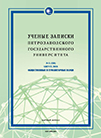ЭТИМОЛОГИЧЕСКАЯ МАГИЯ В РУССКИХ СНОТОЛКОВАНИЯХ
ETYMOLOGICAL MAGIC IN RUSSIAN INTERPRETATIONS OF DREAMS
Author(s): Tatyana Semenovna SadovaSubject(s): Language and Literature Studies, Literary Texts
Published by: Петрозаводский государственный университет
Keywords: Russian folklore language; folk interpretations of dreams; folk etymology; Russian folk signs; genre synonymy; folklore text
Summary/Abstract: In traditional folklore communication the folk etymology often acts as a source for the origin of various cultural texts: verbal, actionbased,and ceremonial. N. I. Tolstoy called such linguistic facts the etymological magic. A set of weather and superstitious signsevolved on the basis of folk etymology. The study shows that some verbalized superstitions include the names of various ChristianSaints: Poseesh lyon na Olyoenu (Sow flax on the day of the Saints Konstantin and Elena – and yield good harvest) – budut dlinnyielnyi. The semantic attraction of accordant words, consequently, results in the appearance of separate facts of folklore culture,and moreover, in separate cultural texts. The role of the folk etymology in dream telling practice is investigated. The dream tellingpractice is the folklore form similar in the interpretation and structure to a usual sign: Videt vo sne pech – k pechali. On the basis ofrapprochement of accordant nominations a semantic development of the initial sign is developed. As a result of the process the leftand right parts of the “dream sign” become widely used under the laws of the intra genre synonyms’ spread and popularization. Todaythe evolution of the dream telling genre is based on the same mechanisms as in the earlier days. Folk interpretations of human dreamshave semantic characteristics typical for the semantics of “dream signs” and their prophetical value.
Journal: Ученые записки Петрозаводского государственного университета. Общественные и гуманитарные науки
- Issue Year: 2016
- Issue No: 5 (158)
- Page Range: 46-49
- Page Count: 4
- Language: Russian

